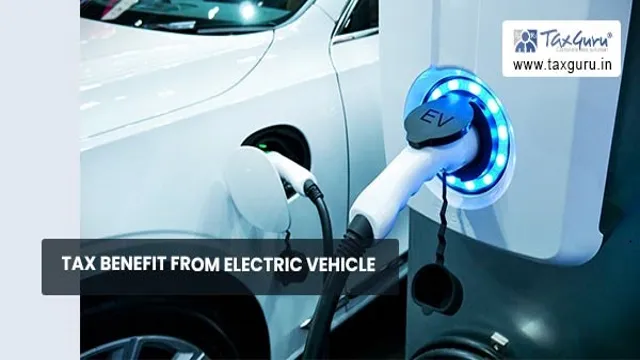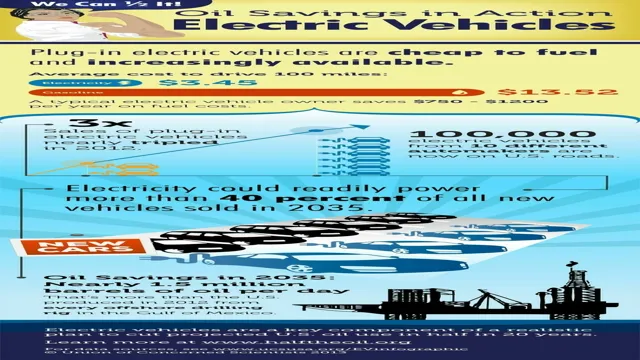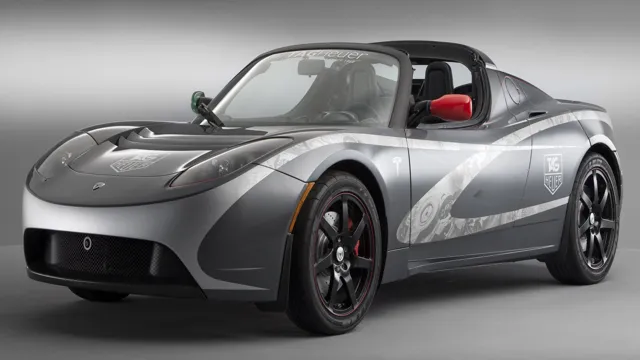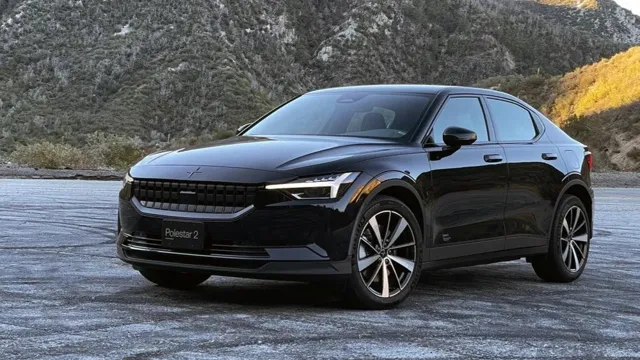Charge up Your Savings: How Electric Cars Offer Income Tax Benefits
Electric cars- they are the talk of the town these days. Not only are they eco-friendly, but they offer numerous benefits to their owners, including income tax savings! Owning an electric car is no longer a luxury- it is a wise investment that can help you save a considerable amount of money in the long run. Whether you are buying a new electric car or switching from a gas-powered vehicle, the income tax incentives available to electric car owners are hard to ignore.
In this blog, we will delve deeper into the tax benefits of owning an electric car- so buckle up, and let’s get started!
Government Incentives
If you’re thinking about purchasing an electric car, you could be eligible for an income tax benefit. The federal government offers a tax credit of up to $7,500 for the purchase of a qualifying electric vehicle. However, keep in mind that this credit begins to phase out once a manufacturer sells more than 200,000 units, so it’s worth checking the availability of this credit for the specific model you’re interested in.
Additionally, several states offer additional incentives such as sales tax exemptions, rebates, and HOV lane access for electric car owners. These incentives can vary by state or even by city, so it’s essential to research the specific incentives available to you in your area. Overall, these incentives can help make the purchase of an electric car more affordable and compelling, while supporting a cleaner future.
Federal Tax Credit
The Federal Tax Credit is a government incentive that aims to promote the use of renewable energy sources and reduce dependence on fossil fuels. It provides a dollar-for-dollar reduction in the amount of federal income tax owed by eligible individuals and businesses who have installed qualifying renewable energy systems. This tax credit is available for a variety of systems, including solar panels, wind turbines, geothermal heat pumps, and fuel cells, and it covers up to 26% of the total installation cost.
Additionally, this government incentive is scheduled to phase out gradually over the next few years, so it’s important to take advantage of it while it’s still available. By utilizing renewable energy sources, we can reduce our carbon footprint and help mitigate the effects of climate change, while also saving money in the long run. So, if you’re considering installing a renewable energy system, the Federal Tax Credit is a great opportunity to make it more affordable and accessible.

State Tax Credits and Rebates
State tax credits and rebates can be a great way to save money on your taxes each year for various expenses. Many states offer tax credits and rebates for things like buying energy-efficient appliances or making upgrades to your home’s heating and cooling systems. These incentives can also extend to businesses that invest in renewable energy, research and development, or job creation.
If you’re considering making a large purchase or investment that qualifies for a state tax credit or rebate, it’s important to do your research to find out what incentives are available in your state. These government incentives can help make your investment more affordable and provide a much-needed boost to your bottom line. So why not take advantage of these opportunities and see how much you can save on your taxes this year?
Qualifying for Tax Benefits
Electric vehicle owners may qualify for income tax benefits that can add up to significant savings on their annual taxes. The federal government offers a tax credit of up to $7,500 for the purchase of a qualifying electric vehicle. In addition, many states also offer their own incentives, such as tax credits, rebates, or exemptions.
However, it’s important to note that not all electric vehicles qualify for the tax credit and each state may have their own specific requirements. To ensure eligibility, it’s recommended to check with the IRS and your state’s department of revenue. These tax benefits can not only save you money, but also make owning an electric vehicle more affordable in the long run.
So, if you’re in the market for a new car, consider the potential tax benefits of buying an electric vehicle.
Electric Car Eligibility Requirements
Qualifying for tax benefits when purchasing an electric car is a great way to offset the initial cost of the vehicle. To be eligible for federal tax credits, the electric car must meet certain requirements. The vehicle must be a new purchase with a gross vehicle weight rating (GVWR) of less than 14,000 pounds, and it must be purchased for personal use, not for resale.
Additionally, the vehicle must be propelled by an electric motor that draws power from a battery with at least 4 kilowatt hours (kWh) of capacity. The tax credit amount depends on the battery capacity and the manufacturer, with a maximum credit of $7,500 for most electric cars. It’s important to keep in mind that the tax credit begins to phase out after a manufacturer has sold over 200,000 qualifying electric vehicles in the United States.
Overall, owning an electric car not only benefits the environment, but it also provides potential tax savings for individuals who qualify.
Alternative Fuel Motor Vehicle Credit
If you’re the owner of an alternative fuel motor vehicle, you may be eligible for tax credits that can help you save money come tax season. However, not all alternative fuel vehicles qualify for these credits. To qualify for the credit, your vehicle must meet certain requirements set forth by the government.
These requirements include things like how many miles per gallon or the equivalency of your vehicle gets, as well as what type of fuel it uses. It’s important to note that the credit amount will vary depending on a few different factors, such as the make and model of your vehicle, its fuel efficiency, and the amount of time you’ve owned it. In order to claim this credit, you’ll need to file Form 8910 with your tax return.
So if you’re thinking about purchasing an alternative fuel vehicle or already own one, be sure to check the IRS guidelines to see if you qualify for this valuable tax credit.
Maximizing Your Tax Savings
If you’re thinking of buying an electric car, you may have heard about the income tax benefit that comes with making such a purchase. The federal government offers a tax credit of up to $7,500 for electric and plug-in hybrid vehicles, which can significantly lower your tax bill. However, there are some stipulations to be aware of.
The credit is only available for new vehicles purchased for personal use, not for leased or used cars. It also starts to phase out once a manufacturer sells 200,000 eligible vehicles. This means that some popular models, such as the Tesla Model S and Model X, are no longer eligible for the full credit, but other manufacturers like Nissan and Chevrolet still have vehicles that qualify.
Make sure to research which vehicles are eligible and speak to a tax professional to ensure you’re maximizing your tax savings when purchasing an electric car.
Keeping Track of Your EV-Related Expenses
As electric vehicles gain in popularity, many people are starting to wonder about the tax benefits that they can receive. One of the most effective ways to maximize your tax savings when it comes to EVs is to keep track of all related expenses. This can include everything from the cost of your vehicle and charging stations to any repairs or maintenance that are required.
By doing so, you can claim these expenses as deductions on your taxes, reducing the amount that you owe and potentially putting more money back in your pocket. Additionally, it’s important to stay up-to-date with any tax credits or rebates that may be available, as these can also help to lower the overall cost of owning an EV. With a little bit of effort and planning, you can make the most of your investment in an electric vehicle while also taking advantage of the tax benefits that come with it.
Consulting with a Tax Professional
If you want to maximize your tax savings, it’s important to consult with a tax professional. Not only can they help you navigate the complex tax code, but they can also provide valuable insights into deductions and credits you may have missed on your own. A tax professional can analyze your financial situation and identify areas where you can save money on your taxes.
They’ll work with you to ensure that you’re taking advantage of every available tax break, such as deductions for charitable donations or business expenses. By working with a tax pro, you can feel confident that you’re paying only what you owe, and not a penny more. Additionally, a tax professional can provide year-round tax planning advice that can help you save money in the long run.
So if you’re serious about maximizing your tax savings, don’t hesitate to seek out the help of a qualified tax professional.
Conclusion: Investing in an Electric Car is a Smart Financial Decision
In conclusion, the income tax benefit for electric cars represents a win-win situation for both the environment and savvy taxpayers. By choosing to invest in clean and sustainable transportation, we can collectively reduce our carbon footprint and promote a more sustainable future. Plus, with the added bonus of a tax break, it’s a no-brainer for those looking to save a little extra on their bottom line.
So let’s all hop on the electric bandwagon and enjoy the ride towards a cleaner and greener tomorrow!”
FAQs
What is the income tax benefit for electric cars?
The income tax benefit for electric cars is a federal tax credit of up to $7,500 for the purchase of a new electric vehicle.
How do I claim the income tax benefit for my electric car?
To claim the income tax benefit for your electric car, you need to file IRS Form 8936 with your federal income tax return.
Is the income tax benefit for electric cars available for used electric vehicles?
No, the income tax benefit for electric cars is only available for new electric vehicles.
Is there a limit on the number of electric vehicles that qualify for the income tax benefit?
No, there is no limit on the number of electric vehicles that qualify for the income tax benefit. However, the tax credit begins to phase out once a manufacturer sells 200,000 electric vehicles.




